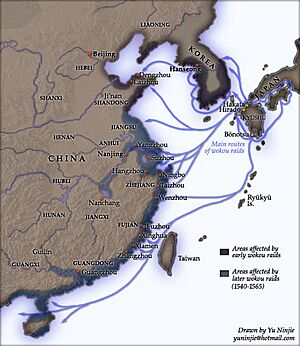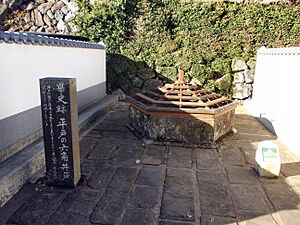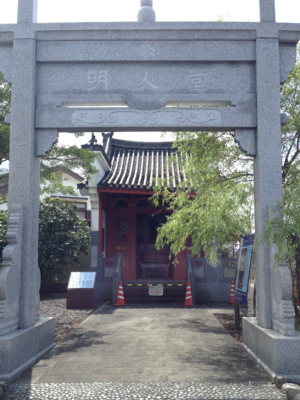Wang Zhi (pirate) facts for kids
Quick facts for kids
Wang Zhi
|
|
|---|---|
| 王直 | |
| Born |
She County, Ming China
|
| Died | 22 January 1560 |
| Cause of death | executed |
| Piratical career | |
| Nickname | Captain Wufeng (五峰船主) |
| Years active | 1540–1560 |
| Base of operations | South and East China Seas |
| Battles/wars | Jiajing wokou raids |
| Wang Zhi | |||||||||||||||||
|---|---|---|---|---|---|---|---|---|---|---|---|---|---|---|---|---|---|
| Chinese name | |||||||||||||||||
| Chinese | 王直 | ||||||||||||||||
|
|||||||||||||||||
| Japanese name | |||||||||||||||||
| Kanji | 王直 | ||||||||||||||||
|
|||||||||||||||||
Wang Zhi (Chinese: 王直 or 汪直), also known as Wufeng (五峰), was a powerful Chinese merchant and pirate leader in the 1500s. He was a major figure among the wokou pirates during the time of the Jiajing Emperor in China.
Wang Zhi started as a salt merchant. But because the Ming dynasty government banned all private overseas trade, he turned to smuggling. He became the head of a large group of traders and pirates. This group operated across the East and South China Seas, reaching from Japan to Thailand.
Through his secret trading, Wang Zhi helped spread European firearms across East Asia. He also played a role in bringing the first Europeans, the Portuguese, to Japan in 1543. However, the Ming government blamed Wang Zhi for the many pirate attacks, known as the Jiajing wokou raids. They executed him in 1560 when he was in China, trying to get the trade bans lifted.
Contents
Wang Zhi's Early Life and Business
Wang Zhi was born in She County in the Huizhou region of China. This area is now part of Huangshan City, Anhui. His mother had a different family name, Wāng, which is why some old writings call him Wāng Zhi instead of Wáng Zhi.
Wang Zhi became a salt merchant when he was young. This was a common business in Huizhou because of the Ming government's salt trade rules. He made a lot of money from salt, but his business later failed.
In 1540, he moved to Guangdong province in southern China with his business partners, Xu Weixue and Ye Zongman. In Guangdong, rules about sea trade were not as strict. Wang Zhi and his partners built large junk ships. They used these ships to carry illegal goods like saltpeter, silks, and cotton to markets in Southeast Asia and Japan. During his time in Southeast Asia, he met the Portuguese, who had been in the area since 1511.
At this time, all private sea trade was against the law in China. The Ming dynasty had banned it from the very beginning. All trade with other countries was supposed to happen through official "tribute trade". In this system, foreign countries would give gifts to the Chinese emperor. They would then be seen as loyal to the Ming, and the emperor would give them gifts in return. This official trade was not enough for what people wanted to buy and sell. Wang Zhi's smuggling business filled this need.
Bringing Portuguese Guns to Japan
On September 23, 1543, Wang Zhi traveled with some Portuguese men on a ship to Tanegashima. This is a Japanese island southeast of Kyushu. This trip was one of the first times Europeans ever set foot in Japan.
Japanese records from that time call Wang Zhi by his nickname, Wufeng. They describe him as a smart Chinese scholar. He could talk with the local Japanese people by writing Chinese characters in the sand. This was possible because China and Japan used the same written language back then.
The Portuguese men looked very different, which caused a stir on the island. They were eventually brought to the island's leader, Tanegashima Tokitaka. The young leader was very interested in the matchlock guns the Portuguese carried. Wang Zhi helped by explaining how the guns worked.
The Japanese quickly copied these guns, and their use spread across Japan. This made the wars of the Sengoku period even more intense. The guns became known in Japan as tanegashima, named after the island.
The new matchlock guns greatly increased the need for saltpeter. This was a key ingredient for gunpowder. Wang Zhi was ready to supply it. Japan did not make its own saltpeter. So, Wang Zhi brought Chinese and Siamese saltpeter to Japan. He also took Japanese sulfur, another gunpowder ingredient, to Siam. Through this trade, he became very rich and well-known in Japan and other countries.
Japan was in a long period of civil war, so there was no strong central government. This allowed Wang Zhi to make deals with local lords, called daimyō. These lords had real power over their lands. Wang Zhi first set up a base on Fukue Island. He made a deal with the Uku clan, who were the lords of the Gotō Islands. A Chinese town soon grew across the river from the Uku clan's castle.
Wang Zhi also had a home in Hirado, at the northwestern tip of Kyushu. He had the support of its lord, Matsura Takanobu. Wang Zhi's presence in Hirado attracted other merchant-pirates and the Portuguese. The Portuguese sent their "black ship" to Hirado almost every year until the city of Nagasaki was founded.
The Shuangyu Trading Group
In 1544, Wang Zhi joined the Xu brothers. They led a trading group based in Shuangyu, Zhejiang, and were also from Wang Zhi's home county. They noticed Wang Zhi's experience in trade. He quickly became their financial manager. Later, they made him commander of their armed ships and an advisor on military matters. He became known as Captain Wufeng.
Wang Zhi's connections with Japan quickly helped the Xu brothers. In the same year, a Japanese ship on an unofficial trip to China landed in the Chinese port city of Ningbo. This Japanese ship did not have the right papers, so officials in Ningbo turned it away. Wang Zhi convinced the Japanese traders to sell their goods illegally in nearby Shuangyu instead.
The next year, Wang Zhi brought more Japanese traders to Shuangyu. He also encouraged Xu Dong, the leader of the Xu brothers, to send his own ships to Japan. After this, Shuangyu became the main port for Japanese traders to smuggle goods into China.
As Wang Zhi's business grew, he began hiring Japanese fighters. They protected his goods from other pirate groups and the Ming navy. Eventually, they helped him defeat other pirates and bring their followers into his own group. The people of Shuangyu looked up to Wang Zhi and helped the pirates. The smuggling trade brought a lot of money to the island. Villagers, who used to just farm and fish, started making weapons and armor for Wang Zhi and other pirates. They melted copper coins for bullets, used saltpeter for gunpowder, iron for swords and guns, and leather for armor.
The Ming government did not approve of the illegal trade and pirate activities in Shuangyu. In June 1548, a fleet led by General Zhu Wan attacked Shuangyu. They destroyed the town and filled its harbor with stones, making it unusable. Wang Zhi managed to escape Shuangyu with the help of the summer monsoon winds. Xu Dong fled overseas, and Wang Zhi took control of the group he left behind. Since Wang Zhi already managed their ships and money, there was little opposition to him becoming the new leader.
King of Hui: A Powerful Pirate Leader
The destruction of Shuangyu broke up the organized illegal trade. Smugglers spread out along the Chinese coast, and some became pirate raiders. Wang Zhi set up a new base at Ligang, on Jintang Island. He continued to expand his group. He adopted Mao Haifeng, a trader skilled with Portuguese cannons, as his son. Wang Zhi used Mao Haifeng's knowledge to put cannons on his ships.
In 1551, Wang Zhi led a group of merchant-pirates to defeat his rival, Chen Sipan. He did this with the secret help of military officials from Ningbo. With Chen Sipan defeated, Wang Zhi became the most powerful figure in the China seas. Many pirates joined Wang Zhi, and it was said that no ship dared to sail without his flag.
Wang Zhi wanted the Ming government to lift the ban on sea trade and make his business legal. He tried to show that his expansion was helping to keep peace on the coast. He even worked with Ming officials by handing over Chen Sipan to them. But despite his efforts, the Ming authorities made the rules even stricter in 1551. They even banned fishing boats from going to sea. Wang Zhi only received a small reward of rice for his help. Angry, Wang Zhi threw the rice into the sea and sent his pirate fleets to attack the Chinese coast.
The Ming government responded by sending General Yu Dayou with many warships to remove Wang Zhi from Ligang in 1553. Wang Zhi fled to Japan.
Wang Zhi soon set up new bases on the Gotō Islands and in Hirado. He had already established connections there with the local daimyō. In Japan, Wang Zhi called himself the King of Hui. He wore royal clothes and had people carry flags around him. It was said that in Hirado, Wang Zhi had up to 2,000 workers and owned hundreds of ships.
Wang Zhi's influence in Japan grew beyond his bases. He made contact with powerful clans like the Ōtomo clan and the Ōuchi clan. His associates were even part of the court of the Satsuma clan.
Wang Zhi gathered fighters from all over Japan and mixed them with his mostly Chinese groups. He sent these pirate fleets to raid the coast of mainland China from his island bases. These pirates were called wokou ("Japanese pirates"). The attacks became known as the Jiajing wokou raids.
At first, the wokou attacks were quick raids on coastal towns to get supplies and goods for trade. Then they would return to their ships and leave. But the situation grew worse. A pirate raid could involve hundreds of ships, defeat army groups, and surround cities. Coastal cities from Korea to Guangdong were affected. Even Nanjing, a major Ming capital further inland, was threatened.
Wang Zhi might have hoped that such a show of force would make the Ming government legalize private overseas trade. He always said he never led a raid himself. However, the Ming government saw Wang Zhi as the main leader responsible for the destruction on the coast. The Jiajing Emperor ordered Wang Zhi to be captured, dead or alive.
Negotiations and Death
In July 1555, Hu Zongxian, who was from the same region as Wang Zhi, was given the task of dealing with the wokou problem. Unlike earlier officials who were very strict, Hu Zongxian was open to allowing more trade to end the piracy.
Hu Zongxian sent people to Japan to ask for help from Japanese authorities. He also wanted to contact Wang Zhi and convince him to surrender. To show he was serious, Hu Zongxian released Wang Zhi's family from prison. He had them moved to his headquarters in Hangzhou and took care of them.
Wang Zhi and Mao Haifeng met the envoys on the Gotō Islands. They explained that there was no single ruler in Japan who could order all Japanese pirates to stop their activities. However, they were interested in the idea of their trade becoming legal. They offered to fight other pirates for the Ming government. In return, they wanted to be pardoned for their crimes and allowed to present tribute.
Hu Zongxian sent this message to the emperor in Beijing. The court was doubtful and angry. Tributes could only be given by foreigners, so Wang Zhi's request sounded like he was trying to challenge the Ming government. Still, the court did not object to Wang Zhi's offer to fight pirates for them. Soon, Mao Haifeng began clearing out pirate groups on Zhoushan Island.
During the meeting on the Gotō Islands, Wang Zhi also warned that Xu Hai, another pirate leader in his group, was on his way to raid China. Wang Zhi said he could not stop him in time. Peace talks had to pause while Hu Zongxian dealt with Xu Hai's raid in 1556. During the raid, Xu Hai was shocked to hear that Wang Zhi was talking about surrendering to Hu Zongxian. Hu Zongxian used this to trick Xu Hai into betraying his allies. Eventually, the raid was stopped, and Xu Hai and other leaders were killed. Negotiations between Wang Zhi and Hu Zongxian could then continue.
On October 17, 1557, Wang Zhi arrived at Cengang in Zhoushan Island. He came with a large trading fleet sent by Ōtomo Sōrin, a Japanese lord who was excited about China opening trade with Japan. Local officials feared this was another wokou invasion and prepared their soldiers.
When they arrived, Wang Zhi also learned of a plan by Hu Zongxian's officer, Lu Tang. Lu Tang planned to bribe the Ōtomo men to capture Wang Zhi. This made the merchant-pirates suspicious of Hu's true intentions. Hu Zongxian was only able to calm their fears by sending a high official to the pirates as a hostage.
Then Wang Zhi stated his conditions for surrendering. He wanted an official pardon from the emperor, a naval position, and for ports to be opened for trade. In return, he offered to patrol the coast and force other raiders to return to the islands if needed. Hu Zongxian was ready to send Wang Zhi's request to the emperor. But the political situation had quickly changed against opening trade. Hu Zongxian's political supporter, Zhao Wenhua, who favored a peaceful approach, had been accused of stealing money. Hu Zongxian himself was rumored to have taken bribes from Wang Zhi and the Ōtomo.
The political situation made it impossible for Hu Zongxian to ask the emperor to pardon Wang Zhi. Instead, Hu Zongxian told Wang Zhi to present his request to Wang Bengu, a strict official, in Hangzhou.
In December, feeling confident, Wang Zhi landed in Hangzhou. The authorities treated him with respect because they feared angering his followers. They were trying to decide what to do with him. During this time, Hu Zongxian asked Wang Zhi to help make matchlocks for the Ming army. This led to the weapon being widely used in China.
Finally, in February of the next year, Wang Bengu put Wang Zhi in prison. He was still given nice things like books and good food. Wang Zhi believed this was only a temporary situation and hoped for a pardon. But on January 22, 1560, an imperial order sentenced him to death. His wife and children were made into slaves. The wokou raids continued until 1567.
Wang Zhi's Legacy
Wang Zhi left behind a complicated story. He was a merchant who helped sea trade grow, but also a "pirate king" who led violent actions. Years after his death, his name was still used to attack political rivals.
In 1562, Hu Zongxian was forced to retire. He was accused of being too soft and friendly with Wang Zhi, among other things. In another political purge in 1565, Xu Jie claimed that his rival Yan Song's son, Yan Shifan, was plotting to overthrow the dynasty with the rest of Wang Zhi's pirate group. Yan Shifan was executed, and Hu Zongxian, who was also involved, died in prison.
Even the Japanese invasions of Korea from 1592 to 1598 were linked to Wang Zhi in the History of Ming. It claimed that Toyotomi Hideyoshi felt confident to invade Korea and China because of what Wang Zhi's former followers told him. They supposedly said the Chinese feared the Japanese "as if they were tigers." Wang Zhi's reputation as a pirate and a rebel continues in China today. Some even call him a race traitor (hanjian) for working with Japanese pirates.
In Japan today, Wang Zhi is remembered as a figure of trade between China and Japan, not just piracy. Places connected to him are highlighted in Fukue and Hirado. Chinese-style hexagonal wells from Wang Zhi's time have been preserved in Fukue and Hirado. A Chinese temple in Fukue that Wang Zhi was said to have visited has been rebuilt.
In Hirado, Wang Zhi is celebrated for bringing the Portuguese to the city. This marked the start of the Nanban trade in Japan and a time of wealth for Hirado. A statue of Wang Zhi, along with statues of early Europeans who came to Hirado, is on the road to the local history museum. A stone marker stands where Wang Zhi's mansion used to be.
 | James Van Der Zee |
 | Alma Thomas |
 | Ellis Wilson |
 | Margaret Taylor-Burroughs |




